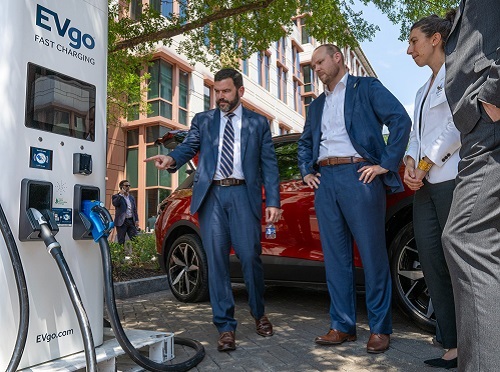The U.S. Department of Transportation, in collaboration with the U.S. Department of Energy and the Joint Office of Energy and Transportation, released a new free technical resource to help larger communities take full advantage of federal funding for electric vehicle charging stations and other forms of electric transportation.
[Above photo by the USDOT]
The new guide – called “Charging Forward: A Toolkit for Planning and Funding Urban Electric Mobility Infrastructure” – provides a comprehensive resource for communities, metropolitan planning organizations (MPOs), transportation providers, businesses, and property owners and developers by including information on how to scope, plan, and identify ways to best leverage billions of dollars in funding from the Infrastructure Investment and Jobs Act or IIJA.
It follows on the heels of the Rural EV toolkit originally issued by the USDOT in 2022 and later updated in 2023.
The toolkit builds on the efforts of the Joint Office to provide states and communities across America with information and assistance to accelerate an electrified transportation system that is convenient, affordable, reliable, and equitable. It also includes guidance to help urban areas implement other forms of electric transportation, such as public transit, electric bikes and scooters, and ride-share services, USDOT said.
In a statement, the USDOT said building an affordable and accessible public charging network will help make electric forms of transportation more convenient for the 71 percent of Americans who live in communities with a population over 50,000. While many EV owners can charge their vehicles at home or work, people who live in higher density areas, especially those living in apartments and condos, may not have easy access to a garage or the space for a private charger, which means they are more reliant on public charging options.
In 2022, USDOT approved plans from all 50 states, Washington D.C., and Puerto Rico to build a nationwide network of EV chargers, supported by $5 billion from the IIJA’s National Electric Vehicle Infrastructure or NEVI program.
This spring, USDOT began the application process for the first $700 million of the total $2.5 billion in funding to build EV charging infrastructure in communities and neighborhoods across the country through the Charging and Fueling Infrastructure or CFI grant program.
